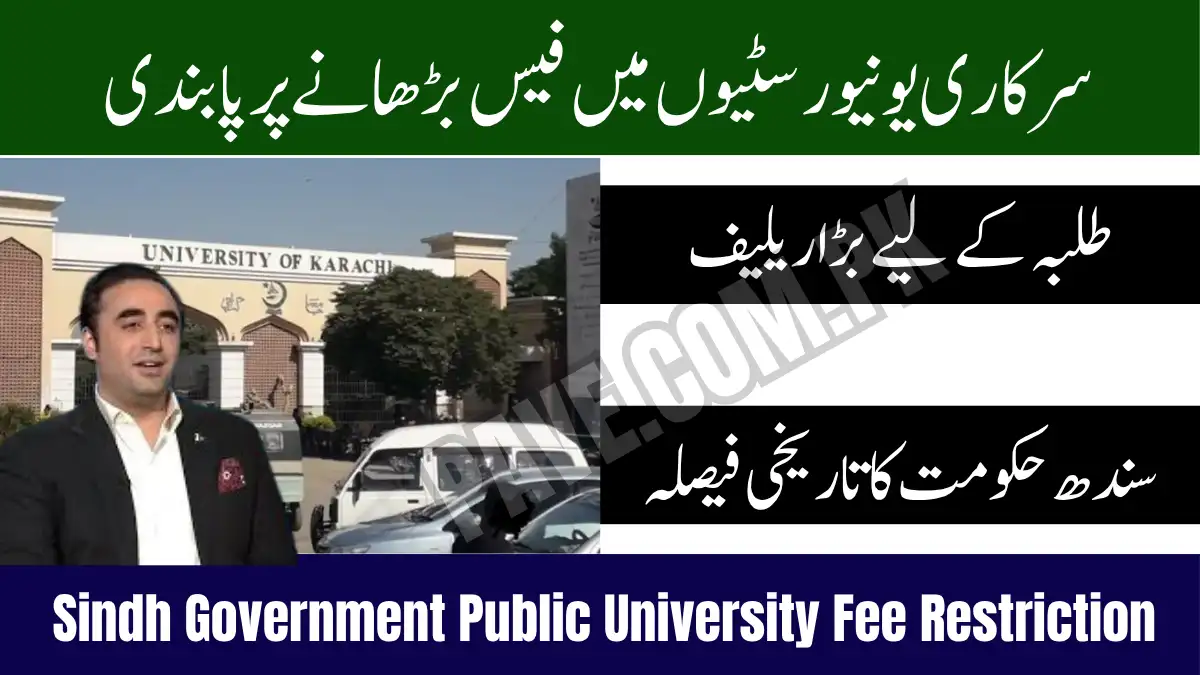Sindh Government Public University Fee Restriction: A Major Step Toward Student Relief
In a landmark move to protect students from rising education costs, the Sindh Government Public University Fee Restriction policy has officially been enforced across the province. Under this new regulation, public universities in Sindh can no longer increase fees without prior approval from the government.
The decision, announced by Minister for Universities and Boards Muhammad Ismail Rahu, aims to provide direct financial relief to thousands of students struggling with the increasing cost of higher education. It also marks a key reform under the province’s broader Sindh higher education reforms agenda for 2025, focusing on equity, transparency, and accountability in university management.
Rising Costs Triggered the Sindh University Fee Policy 2025
For years, students and parents have voiced concerns over unchecked tuition and examination fee hikes in public universities. The Sindh university fee policy 2025 was introduced to address these challenges head-on.
Minister Rahu stated that the new policy ensures no university can impose a fee hike — whether for tuition, registration, or examinations — without the explicit consent of the provincial government.
“Education is a right, not a privilege,” Rahu emphasized. “The Sindh Government Public University Fee Restriction guarantees that financial pressure does not deprive talented students of their educational opportunities.”
This marks a strong administrative intervention against arbitrary financial decisions by universities, aligning with Chief Minister Murad Ali Shah’s and PPP Chairman Bilawal Bhutto Zardari’s vision for accessible and inclusive education.
Why the Restriction Was Necessary
Over the past decade, universities across Sindh have faced shrinking federal grants, leading to severe financial pressure. In an effort to stay operational, many universities resorted to fee hikes — a move that disproportionately affected students from middle- and low-income families.
Minister Rahu noted that while the provincial government has been providing supplementary grants to help institutions remain functional, this was not enough to prevent fee escalation.
The public university fee hike ban Sindh was thus implemented as a balancing mechanism — safeguarding students’ interests while ensuring universities operate with fiscal discipline and transparency.
Read More: Breaking News: Lahore–Sheikhupura Double-Decker Tourism Bus 2025
Sindh HEC Notification 2025: Formalizing the New Oversight Mechanism
Following cabinet approval, the Sindh HEC notification 2025 was officially issued, instructing all universities to comply with the new fee regulation policy. The notification mandates that:
- All proposed fee increases must be submitted to the Sindh Higher Education Commission (Sindh HEC) for review.
- Each university must provide financial justification and expenditure reports before approval.
- The Universities and Boards Department will evaluate these proposals based on student impact, inflation trends, and institutional necessity.
- Non-compliance may lead to administrative penalties or suspension of funding.
This move introduces a new layer of financial accountability across Sindh’s public universities, ensuring every fee adjustment is justified, documented, and transparent.
Student Fee Relief Sindh Government: A Step Toward Economic Justice
Under the student fee relief Sindh government initiative, the policy is designed to provide immediate relief to thousands of students who were previously burdened by annual fee surges.
Officials estimate that more than 400,000 students across Sindh’s public universities will benefit from this decision in the first phase alone. The move also indirectly supports parents and guardians struggling with inflation and rising living expenses.
By freezing fee hikes, the Sindh government has given breathing space to families who often compromise on educational aspirations due to financial constraints.
“This is not just a policy,” said a senior official at the Universities and Boards Department, “it is a commitment to making higher education sustainable and affordable for every student in Sindh.”
Part of Sindh Higher Education Reforms for 2025
The Sindh Government Public University Fee Restriction is just one pillar of the province’s larger Sindh higher education reforms package. Other key reforms under review include:
- Digital university monitoring systems to track administrative spending.
- Standardized grading reforms for classes 9 to 12 to align with national benchmarks.
- Faculty development programs to improve teaching quality in public-sector universities.
- Performance-based grants to reward institutions that improve academic standards without increasing student fees.
These measures reflect a long-term vision to create a balanced, transparent, and student-centered higher education system in Sindh.
Economic Context: Why Universities Needed Oversight
In recent years, Pakistan’s economic volatility has heavily impacted the education sector. Inflation rates have increased operational costs — from electricity and staff salaries to maintenance and equipment — forcing universities to depend on students’ fees to stay afloat.
However, in Sindh, the government recognized that unchecked university autonomy in financial decisions risked excluding economically disadvantaged students.
Hence, through the Sindh university fee policy 2025, the government struck a delicate balance: protecting universities from financial collapse while ensuring students remain protected from arbitrary cost increases.
Reaction from Universities and Students
The decision has sparked diverse reactions across the academic community. Student unions and parent associations have lauded the move, calling it a “historic relief measure.”
“For the first time, we feel heard,” said a student from Karachi University. “We’ve been protesting fee hikes for years. Now, the Sindh Government Public University Fee Restriction finally gives us hope.”
Meanwhile, several university administrators expressed concern about limited funding sources but agreed that financial transparency is long overdue. Many have called for timely provincial grants to prevent disruption in academic activities under the new rules.
The Sindh government has assured that additional budget allocations will be made available to bridge the financial gap for universities complying with the fee restriction policy.
Read More: National Grid Company NGC Internship Program 2025
Public Welfare and Bilawal Bhutto’s Education Vision
Minister Ismail Rahu emphasized that the decision embodies Bilawal Bhutto Zardari’s welfare-driven education vision, focusing on protecting students, empowering youth, and strengthening the public education system.
Education, health, and social welfare remain at the core of Bilawal’s “People First” agenda. The Sindh government continues to expand this vision through policies like:
- The Benazir Undergraduate Scholarship Program
- The Sindh College Wi-Fi Initiative
- And now, the Sindh Government Public University Fee Restriction policy
Together, these steps reinforce the government’s broader strategy of investing in youth development while combating inequality in education.
Plans for the Future: Building Financially Stable Universities
While the government takes charge of fee regulation, efforts are simultaneously underway to make universities more financially independent through innovation and research-based funding.
The Sindh Higher Education Commission (SHEC) plans to introduce:
- Endowment funds and alumni contribution models
- Partnerships with private sector industries
- Commercialization of research outputs to generate revenue
These models will reduce dependence on tuition fees, allowing universities to grow sustainably without burdening students.
Implementation Challenges and Oversight
The success of the Sindh university fee policy 2025 will depend on effective implementation. A joint oversight committee has been formed to monitor compliance, conduct audits, and handle student complaints regarding fee irregularities.
Digital monitoring tools are also being developed by the Sindh IT Board to ensure real-time transparency in university finances — marking a new era of smart governance in the education sector.
Conclusion
The Sindh Government Public University Fee Restriction stands as a progressive and student-friendly policy that redefines higher education governance in the province. By prioritizing student welfare and promoting financial accountability, Sindh has set a national example for balancing accessibility and institutional sustainability.
This initiative not only ensures student fee relief Sindh government but also strengthens the foundation of Sindh higher education reforms—moving the province closer to a future where education is affordable, transparent, and equitable for all.
As the Sindh HEC notification 2025 is implemented, thousands of students will experience the tangible benefits of a system that finally puts their rights first — reaffirming Sindh’s leadership in progressive educational governance.







